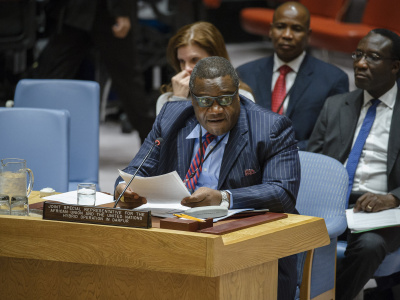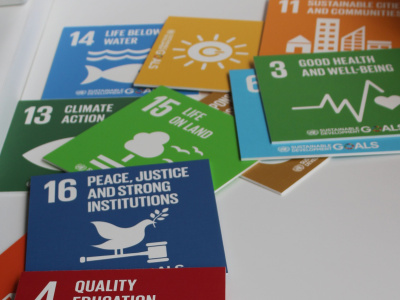
The European Union and the United Nations need each other more than ever
In the past few months, the EU institutions have consistently expressed their support to the UN and its reform, in the face of a rapidly changing world. At a time when commitments to multilateralism are eroding, it appears more essential than ever for the UN and the EU to have a strong cooperation – not least in the field of conflict prevention and peacebuilding. A few weeks ago, ECDPM organised an expert roundtable in Brussels to discuss this with UN representatives (including Marc-Andre Franche, Head of the UN Peacebuilding Fund) and experts working on EU peacebuilding policies. These are our main takeaways.
The EU and the UN: Money, politics and influence?
Our recent analysis on support to peacebuilding suggests that geopolitical, European and national political dynamics evolve at an increasingly fast pace. On the EU side, there is an increasing sense of necessity to be the champions of multilateralism and of the UN, in a context where traditional supporters of the rules-based international order, like the US, retreat from multilateral institutions. At the same time, Trump’s way of governing is also affecting the EU, and populist and interest-driven narratives are much more easily sold in member states. A constructive cooperation between the EU institutions and the UN also risks being somewhat hampered by frustrations on both sides.
The recently published OECD-DAC peer review of EU development cooperation showed that the EU provides a significant amount of funds to multilateral organisations (on average USD 3 billion per year in 2015-2016, most of which were UN agencies). But the EU does not like to be treated like a ‘giant ATM machine’ by the UN, and finds the UN very bureaucratic and hard to change – a charge that is often made ironically at the EU itself. The UN, on its part, is often frustrated by the fact that the EU does not respect or understand its unique mandate. It is not just another implementer and has to maintain its own political independence.
While the relationship has certainly improved, it’s important to understand where the lack of trust comes from on both sides. Indeed, the quantum leap wanted by the UN Secretary General in funding activities to prevent violent conflict is hardly going to be met without EU funds. On the UN side, it will be important to start off the conversation not talking about the money but in a different way and ensure that the EU not only sees the benefits of the partnership but also gets some sort of recognition.
The EU, on the other hand, will have to come up with more operational proposals on that partnership and confront its own political troubles. There is a lot of fragmentation among the EU member states on how they engage at the UN and the political messages they send. The EU institutions can play a positive role in bringing these different strands together, and be a much louder, constructive voice on the UN reform.
Peacebuilding, an area where the need for cooperation is even greater
This is the worst and the best of times for support to peacebuilding. Funding for peacebuilding, while growing, remains low, especially compared to humanitarian spending; it represents only 1% of total ODA and is very reliant on a small number of European countries and the EU institutions. Both the UN and the EU need to engage continuously with their member states to show the effectiveness of peacebuilding if they want to increase this 1%. This includes getting better at showcasing concrete examples where peacebuilding has worked and at showing the counter-productivity of short-term approaches.
At the same time, peacebuilding could help tackle some of the challenges the world is facing. There are opportunities to be seized in the UN reform of peace and security. The creation of a Department for Political and Peacebuilding Affairs (DPPA) and a Department for Peace Operations (DPO) will help make sure that the bits of the UN that prevent conflict act in concert with those that respond to it and increase the relevance of peacebuilding in the UN system. Besides, the Peacebuilding Support Office has new responsibilities with regards to the UN partnership with the World Bank and the EU in relation to crisis-affected countries, including coordination of joint analysis.
A changing world, opportunity or risk for better EU-UN cooperation?
The OECD-DAC peer review of EU development cooperation highlighted that while the EU plays a key role in shaping and supporting global sustainable development, this leadership is increasingly threatened by the rise of nationalism in some of its member states. The year 2019 will be a critical year for the EU, with a new multiannual budget for 2021-2027 being negotiated and new EU political leadership taking office. The EU institutions’ appetite to work closely with the UN and engage in its reform in this context remains to be seen.
It is encouraging that the EU is considering to start ‘SDG dialogues’ with partner countries jointly with the UN in its programming process. But more importantly, good words about changing the institutions have to translate into incentives and implementation. Participants of our roundtable discussion pointed out that cooperation between them on the ground works really well when there is a political consensus among them and they have a good understanding of their complementarities – not to mention senior personnel with the right attitude.
In a context where the number of countries with violent conflicts is the highest in the last 30 years, it is positive that the EU and the UN agreed to strengthen their partnership on peace operations and crisis management in the margins of the UN General Assembly in September 2018. But more is needed on the peacebuilding front, if we are to move from ‘firefighting’ to prevention, as the UN Secretary-General Guterres aspires to. This will be a key challenge to be nurtured for the new EU political leadership taking office in late 2019 and the senior bureaucrats making strategic decisions on where to put the resources. In the meantime, plenty of homework needs to be done on both sides.
The views expressed are those of the authors and not necessarily those of ECDPM.





